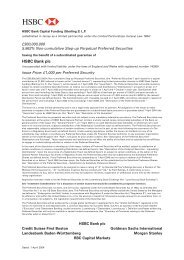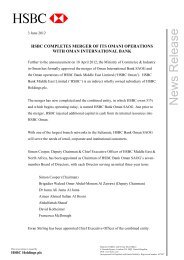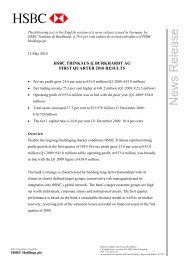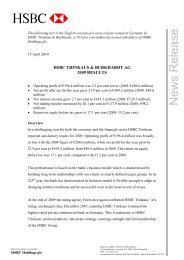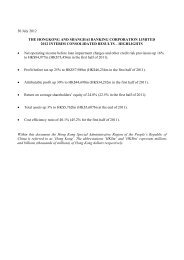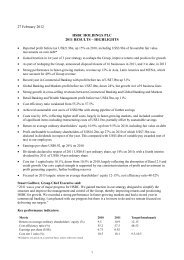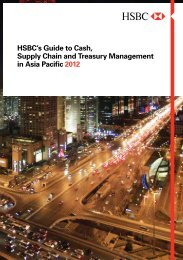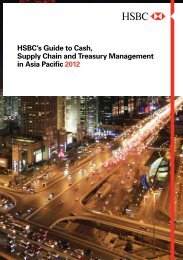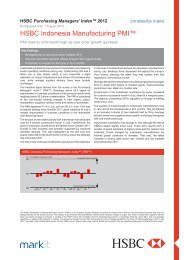HSBC Doing business in Mexico
HSBC Doing business in Mexico
HSBC Doing business in Mexico
Create successful ePaper yourself
Turn your PDF publications into a flip-book with our unique Google optimized e-Paper software.
24<br />
Audit and accountancy<br />
Companies listed on the<br />
Mexican Stock Exchange,<br />
government-owned companies<br />
and companies <strong>in</strong> the f<strong>in</strong>ance<br />
sector regulated by The<br />
National Bank<strong>in</strong>g and Securities<br />
Commission (Comisión<br />
Nacional Bancaria y de<br />
Valores or CNBV), the National<br />
Commission for the Protection<br />
and Defence of Users of<br />
F<strong>in</strong>ancial Services (CONDUSEF)<br />
or the National Insurance and<br />
Bond<strong>in</strong>g Commission, such as<br />
banks and brokerage firms, are<br />
required to have <strong>in</strong>dependent<br />
auditors perform annual audits<br />
of their f<strong>in</strong>ancial statements.<br />
In addition, companies meet<strong>in</strong>g<br />
any of the follow<strong>in</strong>g threshold<br />
requirements must have<br />
<strong>in</strong>dependent auditors conduct<br />
annual audits and file a<br />
tax report.<br />
The follow<strong>in</strong>g bases are<br />
currently valid:<br />
• Annual revenues of at least<br />
Mex$34,803,950;<br />
• Total assets of at least<br />
Mex$69,607,920; or<br />
• Three hundred employees<br />
or more <strong>in</strong> each month of<br />
the preced<strong>in</strong>g year.<br />
Annual audits are required<br />
<strong>in</strong> the year after a company<br />
reaches any of the above<br />
conditions. Audited f<strong>in</strong>ancial<br />
statements are presented<br />
at the annual shareholders’<br />
meet<strong>in</strong>g, to the tax authorities,<br />
and if the company is publicly<br />
held, to the CNBV. Audits of<br />
f<strong>in</strong>ancial statements prepared<br />
under Mexican GAAP are<br />
conducted under Mexican<br />
Generally Accepted Audit<strong>in</strong>g<br />
Standards (GAAS). These<br />
f<strong>in</strong>ancial statements must also<br />
be filed with the tax authorities<br />
along with a tax compliance<br />
report. These reports are filed<br />
electronically with the tax<br />
authorities via the <strong>in</strong>ternet.<br />
When a company has lost<br />
two-thirds of its capital stock,<br />
a go<strong>in</strong>g-concern paragraph<br />
must be attached to the report,<br />
because it is considered a<br />
technical bankruptcy. In a worstcase<br />
scenario, the audit op<strong>in</strong>ion<br />
may be modified.<br />
The CNBV and the National<br />
Insurance and Bond<strong>in</strong>g<br />
Commission (CNSF) are<br />
statutorily authorised to issue<br />
account<strong>in</strong>g and report<strong>in</strong>g<br />
standards for the companies<br />
they regulate. Bank<strong>in</strong>g, stock<br />
brokerage houses, <strong>in</strong>vestment<br />
funds, f<strong>in</strong>ancial leas<strong>in</strong>g,<br />
factor<strong>in</strong>g and other f<strong>in</strong>ancial<br />
<strong>in</strong>stitutions are subject to<br />
regulations issued by the<br />
CNBV. Insurance and bond<strong>in</strong>g<br />
companies are subject to<br />
regulations issued by the<br />
CNSF. The primary differences<br />
between the account<strong>in</strong>g<br />
practices established by the<br />
CNBV and the IMCP (Mexican<br />
Institute of Public Accountants)<br />
refer to the valuation of<br />
repurchase transactions (repos)<br />
and non-consolidation of<br />
non-f<strong>in</strong>ancial subsidiaries. The<br />
account<strong>in</strong>g practices issued by<br />
the CNSF differ from Mexican<br />
GAAP primarily <strong>in</strong> the follow<strong>in</strong>g<br />
areas: partial recognition of<br />
<strong>in</strong>flationary effects and deferred<br />
taxes; certa<strong>in</strong> capital reserves<br />
shown as liabilities; the equity<br />
method used for <strong>in</strong>vestments<br />
<strong>in</strong>stead of consolidation;<br />
and the assumptions used<br />
for determ<strong>in</strong><strong>in</strong>g employee<br />
compensation at retirement.<br />
Local GAAP<br />
The f<strong>in</strong>ancial statements must<br />
be presented at the annual<br />
shareholders’ meet<strong>in</strong>g and<br />
approved by the shareholders.<br />
All companies under a S.A.<br />
form of organisation must have<br />
a statutory auditor (comisario)<br />
appo<strong>in</strong>ted by the shareholders.<br />
Because of the statutory<br />
auditor’s functions and<br />
responsibilities, he is usually<br />
an <strong>in</strong>dependent public<br />
accountant, and generally a<br />
representative of the company’s<br />
<strong>in</strong>dependent audit<strong>in</strong>g firm. The<br />
statutory auditor may not be<br />
an employee or executive of<br />
the company. Each year, the<br />
statutory auditor issues a report<br />
stat<strong>in</strong>g whether the f<strong>in</strong>ancial<br />
statements have been prepared<br />
<strong>in</strong> accordance with Mexican<br />
GAAP. The statutory auditor<br />
also determ<strong>in</strong>es whether the<br />
company’s board of directors<br />
has <strong>in</strong>formed the shareholders<br />
of all significant matters.<br />
Professional audit<strong>in</strong>g standards<br />
require that a public accountant<br />
act<strong>in</strong>g as a statutory auditor<br />
rely on an annual exam<strong>in</strong>ation<br />
conducted <strong>in</strong> accordance<br />
with generally accepted<br />
audit<strong>in</strong>g standards.<br />
All Mexican corporations<br />
must ma<strong>in</strong>ta<strong>in</strong> detailed<br />
account<strong>in</strong>g records <strong>in</strong> Spanish<br />
us<strong>in</strong>g Mexican pesos and <strong>in</strong><br />
accordance with Mexican<br />
GAAP. Mexican companies<br />
must ma<strong>in</strong>ta<strong>in</strong> the follow<strong>in</strong>g:<br />
• a general ledger;<br />
• a general journal;<br />
• an '<strong>in</strong>ventories and trial<br />
balances' record;<br />
• historical m<strong>in</strong>utes of<br />
board of directors’ and<br />
shareholders’ meet<strong>in</strong>gs;<br />
• a record of <strong>in</strong>vestments<br />
<strong>in</strong> shares;<br />
• a record of debts held <strong>in</strong> foreign<br />
currency, credits and cash; and<br />
• a record of registered shares.<br />
The pr<strong>in</strong>cipal books and<br />
records, together with all<br />
support<strong>in</strong>g documentation,<br />
must generally be ma<strong>in</strong>ta<strong>in</strong>ed<br />
at the official domicile of the<br />
<strong>bus<strong>in</strong>ess</strong> and rema<strong>in</strong> available<br />
for 10 years.<br />
The Mexican Corporations Act<br />
and the Income Tax Law only<br />
<strong>in</strong>clude general account<strong>in</strong>g<br />
requirements and do not<br />
specify the form or content<br />
of the books and accounts<br />
that a company must ma<strong>in</strong>ta<strong>in</strong>.<br />
Each company is required to<br />
keep the records necessary<br />
to support the amount of<br />
gross <strong>in</strong>come, deductions and<br />
tax credits conta<strong>in</strong>ed <strong>in</strong> the<br />
taxpayer’s Mexican <strong>in</strong>come<br />
tax return on an accrual basis.<br />
Management determ<strong>in</strong>es the<br />
exact form of the records.



